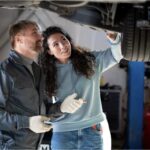When in possession of a pco rental, the last thing you’d want to do is damage it – but bad habits can be your undoing. Most won’t believe they have them – but do we even know what they are?
Have a look at these common habits which, if you can identify any of them within yourself, need to be removed asap!
1. Overloading Your Vehicle
All cars have a limit. Your owner’s manual will inform you if what that limit is, and it’s not advised to go beyond that, nor to reach that limit on a regular basis.
The more weight placed upon your car, the more strain you place on the brakes and suspension – so avoid heavy items in your daily travels unless they’re essential.
2. Revving the Engine When Cold
Avoid revving the engine when it’s cold – let the engine oil warm up instead, which avoids potential damage. Don’t worry about the journey being short or long – in either circumstance, revving the engine too early brings about wear and tear.
3. Neglecting Warning Lights
Today’s dashboards can seem quite complex, but it’s important to know which warning lights require an immediate response. By checking your owner’s manual, you’ll be able to determine which warning lights can wait and which need swift assistance.
The following warrant a call to your breakdown provider, or local garage:
- Airbag
- Braking System
- Cooling System
- Engine/ECU
- Oil Pressure
- Power Steering Failure
4. Flooring the Accelerator in a High Gear
It’s common for drivers to accelerate at low rpm (revs per minute), or in too high a gear, which makes the engine work harder.
It’s better to shift the gears down, allowing the revs to rise, and then shift the gears up. This will do your car wonders when you’re carrying something heavy, or when driving up a hill/slope.
5. Hitting Potholes and Speed Bumps
Damage due to potholes is a third of recorded vehicle damage overall! Avoid potholes at any opportunity; driving over them can lead to buckled wheels, lumps in the Tyre, cracked alloys, and more.
6. Late Braking
Late braking should be an exception, in situations of an emergency. Doing this all the time wears out your brake pads and brake discs more quickly, as well as costing you more fuel.
By knowing the route ahead, and driving in a slow and considered manner, you can produce a safer driving experience.
7. Dragging the Brakes Downhill
When you’re driving downhill, shift to a low gear, brake lightly, and then release the pedal, letting the brakes cool. You only need to apply the brakes when necessary.
Dragging your brakes will increase expenses when brake pads and brakes suffer from wear and tear.
8. Resting Your Hand on the Gear stick
By resting your hands on the gear stick, you run the risk of putting pressure on the selector fork, which will bring premature wear and tear. Check your owner’s manual to see if this is something especially warned against for your car.
9. Shifting from Drive to Reverse Before Stopping
Automatic gearboxes are designed to shift gears, not for braking. By shifting the gears before coming to a stop, damage is caused on the transmission band, which is costly part to replace.
Likewise, shifting between reverse and drive with an automatic gearbox will also damage the transmission band.
Need a tow? For fast and reliable car recovery services, visit Instant Recovery.
10. Riding the Clutch
Riding the clutch is when a driver still has their foot on the pedal after changing gear. This is an example of poor clutch control – doing so will damage the plates. The solution is to make sure your foot is off the pedal during a change in gear; or when performing a start up the hill, leave the car in neutral and the handbrake on until you’re ready to move.


